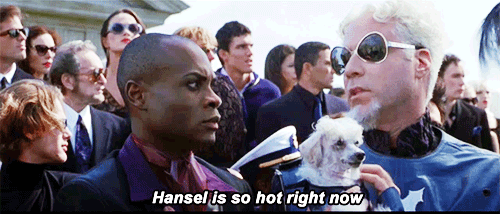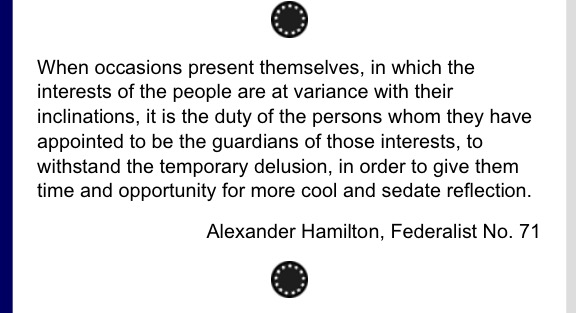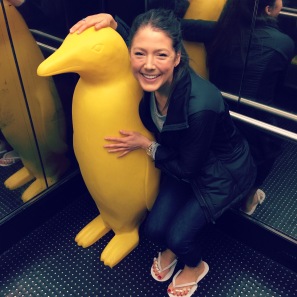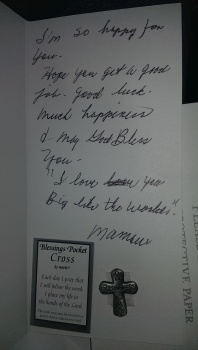To put it simply, I am not very good at speaking.
And not just public speaking, which is met with a healthy level of nervousness for most people, but speaking out loud in general has always been a challenge for me. I don’t know the reasons or cause behind such an impediment, nor could I ever attempt to rationalize this difficulty in communicating as anything more than a simple fear of failure. I’m just scared of messing the words up, so instead of taking the risk, more often than not I choose to keep my mouth shut.
As a self-proclaimed writer, words are quite literally my livelihood. I rely on words for everything – for expression, therapy, introspection, prayer, etc. And I’m good with words, too. I can articulate thoughts and opinion, defend positions and offer sound conclusions with some pretty effective language when the occasion calls for it, but only as long as these words are put on paper. Attempting to do so without a pen in my hand usually results in any intended meaning becoming lost in translation.
This is a big problem. In point of fact, a writer with a communication problem is no writer at all. At least this was the conclusion I came to early on in life. You see, for as long as I can remember there have been stories circulating in my head, pages filled with characters and ideas since I first learned to construct sentences. Solace was found in the blank pages of my notebooks, where I would retreat into distant worlds and go as far as my imagination allowed, becoming anyone I wanted to be. Contrarily, in the reality of my actual world I knew exactly who I was, and she was no story-teller at all. She was shy, uncertain, and scared. Worse, she had no desire to fix the reality in which she lived.
Avoiding this fear was never really an issue until I graduated from the small and comfortable private school that I’d spent over a decade of my life in, forcing me to enter into the unknown arena of college classes. Somehow I managed to survive the brutal instances of being called upon in class, and even muscled through the much-dreaded presentations that the more malicious instructors loved to assign. All such assignments occurred in liberal arts classes, where talking was not only encouraged but necessary for a passing grade. Once finishing the core curriculum at junior college, I had an Associates degree in hand and absolutely no clear direction for moving forward aside from knowing that whatever it may be, my continuing education would never include studies in the liberal arts.
I also knew, however, that a Bachelor’s degree in anything would at some point or another require speaking up, so I began the search for a field that I found interesting enough, and one that didn’t require anything more than introverted study and silence. I had found the courses in Criminology the most engaging and for a time I entertained the notion of becoming a criminal psychologist with career goals as a juvenile probation officer. For one semester I fully embraced this aim and excelled in all my studies of crime investigation, courtroom law, and psychological analyses. Having had two close relationships with juvenile offenders in high school, I rather naively regarded these personal experiences as motivation and qualification for my higher education.
I felt qualified because these individuals that I had formed relationships with had let me in when they’d trusted no other. I believed that this meant that I could someday make a difference in the lives of other similarly troubled souls. I hoped I could achieve with others what I had failed to do as a teenager with these friends, which was to prevent a continued pattern of destruction and save them from a future of disappointment and misery.
The memory of my own disappointing failure was all too fresh at that time, for I had already seen one such friend’s struggle end with his dropping out school our senior year, only to be killed in a motorcycle accident a few months later. The other friend finished school with me, but had resigned himself to a constant state of despair that he attributed to our friend’s death, using it as a reason to drink himself to sleep each night, lamenting his unfulfilled life with bitter rambles in the long evening hours. For my part, this mourning period was recorded in the safe confines of my secret journals, keeping the words that might have helped him in his struggle locked away out of the fear that I might lose him too. I wouldn’t dare tell him the true motive behind my going to classes night after night, this after working all day in order to pay rent for the lease we shared. I couldn’t tell him how desperately I needed to keep him close, to take care of him while he couldn’t do so for himself. I could never say the things I felt, utter out loud the words written daily, for to explain that my greatest hope was to see him happy again, that saving him was my only true goal, would mean opening the door to the worst disappointment of all: rejection.
I couldn’t speak, not even to my closest friend in the world. On paper words have meaning, but they have no weight if never read; out loud, words have consequences.
While I may not have told him the whole truth, I was as honest as my protective walls allowed. When asked why I would choose such a profession, I told him of my desire to help troubled teens, even if it meant that only one life might be saved.
“You can’t save someone from who they are,” he told me. “If they’re anything like me, they’ll hate you for even trying.”
Unlike me, he was never lacking for words once he felt comfortable enough around a person to speak. And once he did, people listened. I was always listening, and this is sometimes all that a person needs – which I told him in response.
“And sometimes people are just pissed off at the world. Kids like that won’t ever trust you or accept you. I don’t think you have what it takes for that kind of rejection. You just don’t get it.”
Words have consequences indeed. These in particular have weighed me down for years. Soon after that conversation I abandoned my goals in juvenile rehabilitation and, at the semester’s end, enrolled in a paralegal certification program at a neighboring city’s community college. If I couldn’t enforce the law and avoid confrontation at the same time, and if I couldn’t practice the law with my inability to speak to defend it, then I would become an expert on the law and work behind the scenes for those who could.
This period of discontent is recorded in my notebooks as well. With my pen I described my growing depression and longing to fill the void that I couldn’t name. I wrote and wrote, scribbling words on countless pages until my hand could no longer hold a pen. Weeks of scribing my confused thoughts and searching through the words they produced brought me no closer to the answers I needed, even though the meaning was there all along.
Words are my life, my soul, my voice – even when I can’t speak them aloud. As an imaginative yet inhibited child, I retreated into my writing and relied on it as an outlet; the same was true for the aimless 21-year old version of myself. Writing has been one of the few constants in my life. I had always been a writer. I had just missed the meaning between the lines of my work. I had mistaken purpose for pastime. I’d harbored my words on paper out of cowardice, ignoring the calling on my heart.
In hindsight, I now recognize this calling as the voice of God spilling through the lines of my words, urging me to step out, to trust His promises, to accept His offering of creative gifts, to rely on Him for strength, and to believe that I do have what it takes because He’s all that I need.
I wish I could say that I answered this call from God after a personal revelation, but He had to use an actual voice and public setting in order to get my attention. Money and months were wasted by dropping out of the paralegal program, but I could no longer ignore what I had subconsciously felt all along. I was a writer, and I would pursue writing the way any person whose father insisted on their finishing any form of higher education should, by enrolling in University of Houston’s College of Liberal Arts English Department.
I wanted to quit after two weeks, having discovered rather quickly just how out of place I was among so many who had embraced their writing long before college, and who enjoyed the sounds of their voices as much as their written work. Opinions were eagerly offered, self-indulgence commonplace in every classroom. I found that most writers, or at least those of my generation in pursuit of an English Literature degree, consider themselves creative geniuses and jump at any chance to showcase their talent or well-read knowledge. The majority of my essays reflected this cynicism toward novice literary critics, while in class discussion I learned to pretend my way through academia, mastering what I dubbed “literary bull shit” in order to blend in with my liberal peers.
It was awful, but also entertaining. It was hard, but doable. I didn’t even throw up before or after my first required presentation in class, which had been assigned in a course of study that I had registered for based on nothing but its safe-sounding title – Hong Kong Cinema. Contrary to my assumptions, there was much more involved in it than simply watching Kung Fu movies for homework. The class centered on the cultural influences of films during Great Britain’s lease agreement of Hong Kong as colonized territory and after it was released back into Imperial China’s possession. Multiple film analysis texts were listed as required reading along with studies on the history of Hong Kong’s ownership, which was discussed for the effect it had on cultural development, especially for those in the generation without memory of being under the umbrella of the Chinese empire. As an autonomously operating government inside the legal but not exercised control of Great Britain, Hong Kong’s 101 years of freedom were spent with the unavoidable knowledge of the fast-approaching lease expiration, and the independence they felt but never owned was expressed most poignantly in their budding film industry.
Movies that I had often enjoyed poking fun at were now seen in an entirely new light. Each one of the sampled viewings was a character study of the clashing generations that divided Hong Kong between those clinging to their heritage in motherland China, and those whose identity was linked to Hong Kong alone. Filmmakers’ opposing views became easily recognizable as the weeks progressed, presented in the different forms of heroic tropes and varying fighting styles, in reverent depictions of ancient custom versus anti-establishment underdogs who stand against an ambiguous figure of oppressive authority. And while all of the films’ dialogue had to be translated by subtitles, the languages used were also telling of this binary cultural state, spoken in either Cantonese or the more traditional Chinese-spoken Mandarin.
It was my favorite class, taught by my favorite instructor, but at the same time it was the scariest and most dreaded of all the courses taken. For as much as I enjoyed it, I could never forget that I was fast approaching the day of my assignment, when I was to lead the class discussion as the “expert” on that week’s material.
Again I wanted to quit. I wanted my car to break down, or my college funds to suddenly run out – anything to avoid the collective gaze of a classroom full of confident intellectuals. I couldn’t speak from the seat at my desk, let alone from a podium at the front! Surely not even God could expect such an effort from me. He had purposed Moses and still let him speak through Aaron, hadn’t he? Where the heck was my verbal articulator? Who would step in to translate for me when I failed to profess the knowledge burdened to me at no choice of my own? What was He thinking?!
I hadn’t wanted to go to college in the first place; I didn’t need to be there! And this became the running theme of my “prayers,” which in the days leading up to my presentation sounded more and more like a tantrum thrown by a petulant child.
At the risk of building up to an event that might seem to be this essay’s intention, I must confess here that my presentation was a massive non-event, the most anticlimactic conclusion to a semester’s worth of preparation and anxiety, and barely worth mentioning at all if I’m being perfectly honest. I wish I had something inspiring to recollect instead, that I could have that moment as a personal testimony of God’s promises fulfilled, and describe a manifestation of God’s gifts as I boldly delivered the most satisfyingly kick-ass end to a lifelong struggle that anyone’s ever seen. I can’t though, because it wasn’t any of these things. The presentation itself wasn’t terrible, I’m happy to say, but I didn’t knock anyone’s socks off with my dazzling insight either. I did, however, walk away with a B- that day, and an A average for the class overall.
Despite my uninspiring performance in class, that day is nonetheless notable for the first attempt of many in pursuit of my degree, and also for what had occurred before class earlier that same morning. One hour before I was to stand at the podium I was sitting in a narrow space between the gray cubicle wall and clerk desk, nervously tapping my foot as I waited for the registrar’s office worker to return from making copies. Because I was still agonizing over the task that awaited me in the next hour, what I had already considered a waste of effort turned into a colossal waste of valuable prep time as the minutes passed by. But there I sat, having brought in my father’s military service documents at his urging, waiting for news that may or may not validate the information that had been passed along by a friend of a friend’s cousin and shared with my aunt, who in turn had told my dad about a supposed Texas legislation that possibly offered some Texas residents the chance of transferring their unused G.I. Bill into “legacy” funds.
Yeah, it sounded made up to me too.
From what little I understood of the fine print, eligibility requirements depended on a large number of factors including date of enlistment, amount of service years, proof of Texas residency, etc. So while the clerk was away from the desk making copies, I had plenty of time to speculate as to how long the review process for such an application would take.
At long last she returned from her task. Separating her paper copies from the originals, she then focused on the computer screen as her fingernails tapped against the keyboard, glancing intermittently at the documents before keying in more information. Her fingers stilled on the keyboard and one hand moved to the mouse, after a few clicks she looked over at me and smiled.
“All right, Ms. Creswell, that about does it,” she said. “Unfortunately you will have to repeat this process for each enrollment period, but it should be much faster now that we have all the information on file.”
Confused, I met her smile with a blank stare. “So when will I know if I’m eligible? Will they call me, or this office, or…”
“Oh! I’m sorry, there was a misunderstanding; I thought you knew! You are eligible to receive the full benefits for tuition fees, but it won’t cover text books, parking…”
I couldn’t even hear the rest of her sentence because I was too focused on the other words. “Full benefits?”
“That’s right.”
“So my tuition for next semester is covered in full?”
She smiled patiently and shifted her computer screen toward me. Leaning forward in my seat, I squinted to read the number her long fingernail pointed to – the negative number at the bottom of the page.
“They’ll all be covered. Your refund for this term’s payment should hit the account in one to two business days.”
Through my blurred vision, I saw when her eyes filled with unshed tears of her own and she reached over to hug me before we both began to laugh. We soon drew the attention of her curious co-workers; one by one they each exited their cubicles and, upon hearing their colleague’s excited explanations, all took turns hugging me too.
Over five years have passed since that morning, and I’m struck with a similar yet different wave of emotions. Disbelief, humility, awe-struck wonder and joy are just a few of the emotions experienced that day as well as today, but retrospect on the event has added a lot more to it now. Recalling the complete and utter amazement I felt at the moment of God’s blessing, I can’t help but feel convicted for allowing it to be taken for granted for even one second.
Looking back, I am reminded of both the simple and the profound instances God shows up, the crazy and unbelievable ways he chooses to bless us even when we aren’t looking. At the same time, I’m ashamed at the crazy and unbelievable lengths He must go to at times just in order to get my attention. For over twenty years I failed to see or hear Him, even in the hours of my darkest need when He revealed Himself to me as the light that led me through. He alone deserved the glory, and even in my ungratefulness His mercy and grace never failed.
I missed what was right in front of me all along, and eventually He just called me out on it. Literally called me out from where I sat in the back of the crowded church.
Hey, remember all those times when things just happened for you out of nowhere, when things just worked out with no explanation? Yeah, that was Me.
So you know that emptiness you feel inside and keep trying to fill? Also Me.
And that direction you’ve yearned for? That purpose-filled life you imagine, the undiscovered passion that you write with hope of someday finding? Do I need to spell that out for you too?
GO WRITE SOMETHING.
Admittedly these were not the actual words spoken to me that day, but it’s pretty close to what went down. The message was clear. I didn’t have any more excuses after that. In less than two minutes, God had effectively removed any vestige of doubt keeping my writing in the shadows by shining His light on the matter.
But recognizing His calling in our creative gifts is only the beginning of the story, regardless of how long it takes some of us to get there. The real challenge comes in how we choose to respond to this call. As C.S. Lewis explains, “we are not necessarily doubting that God wants the best for us, just how painful God’s best will turn out to be”. Remember, to much that is given, much is required. Taking classes at a University was only the start of this for me, and while the experiences never got any easier, I now know that I am capable of overcoming my fear. I do have what it takes to speak out. Even when I fail miserably, even when I stumble on words and embarrass myself, credit can still be received when trying in itself is a victory.
I now see the miracle of my debt-free college education as God’s ultimate reminder – a small example of the kind of favor that awaits those who are willing to step out and into His plan for our lives. I went kicking and screaming the whole way there, and He responded by taking away the burden of tuition. I traded a fast and easy education for a grueling pursuit of a Bachelor’s degree; traded a comfortable, thankless job behind the scenes for an unknown future in writing that will require courage and confidence to share.
Sometimes the trade doesn’t look like it’s in your best interest at all. Sometimes it just looks like a bad deal. But we can’t expect that trading our plans for His best will be an even trade. It may come at great cost, and it may even require going backwards at times, but it will always be progress, and it will always be trading up. What we gain in return – direction, renewed purpose, confidence, etc. – are priceless benefits, and so worth it.
It was never easy in college, but it was worth it after all, and the same will hold true in my future endeavors. The things I have to say are yet to be heard, the stories have yet to be told. The greatest test of my faith and trust in God’s promises has yet to come, though it’s now closer than ever before. I know this to be true because I am writing now in response to this renewed calling on my heart. The fear of failure is a familiar stumbling block on my path; writing in recollection of previous victories is the best defense. When I can’t yet speak, I will write until I can.
I’ll write it out until I remember that I have done it before.
In my final semester of college I took an advanced course for credits required only by graduate students, my only reason being that it was taught by the same instructor of the Hong Kong Cinema class in my first semester. I knew it would terrifying and challenging, based on my own experience and from reading the comments on its online rating, but I also knew it would be interesting and engaging, just as before.
The structures of the two classes were similar, with discourse ranging from various texts and film analyses in a study of surveillance and its effects on society. Unlike the other class, it was held in a quasi-stadium style room with seats surrounding the podium in the center floor. Also different from Hong Kong Cinema, there was no volunteer for the first presentation slot, leading the professor to single out the one recognizable face in the crowd since – in her words – I had done this before. Not having months to prepare and agonize over the assignment made it better and worse at the same time, and in the third week of classes I found myself at the podium and at the center of everyone’s undivided attention.
The focus of that week’s study was Michele Foucalt’s Discipline and Punish: The Birth of the Prison and I was to deliver a lecture that covered the 1st third of the book, which discussed the history of international penal systems, in correlation with one of the films from the course’s selection of study. The film I chose was Charlie Chaplin’s Modern Times. A swan song to the silent movie era, Modern Times was released shortly after sound technology revolutionized the film industry and served as a final farewell for Chaplin, who also starred in and produced the title. It helped that I’d found the movie surprisingly entertaining. Filled with Chaplin’s signature antics and hilarious physical comedy, it provided fans a satisfying conclusion to a cinematic era, while instances of sound disrupting the typical silent narrative were used conscientiously and ironically.
I spoke of these details briefly, keeping focus on the themes of authoritative watchfulness in the narrative as it follows Chaplin’s factory worker through a series of unfortunate events. The story and character derived from Chaplin’s real life experience touring a major automobile factory in the U.S. His observations on the treatment of its workers and the environment as a whole became inspiration for the script, which was layered with social criticisms stemming from Chaplin’s growing disdain of American government. While not the agenda of Modern Times’ lighthearted script, the subtle political tones that spilled out on screen were the product of Chaplin’s controversial socialist ideals that would later lead to the U.S. government barring him from reentering the country.
Like Foucalt’s study on prison ethics, Chaplin too was offering a deep criticism on the heavy hand of authority that demanded uniformity and surrender of self, the discipline found in free society and prison alike. It was a fascinating topic of discussion, and I presented it what best I could in the allotted 25 minute window before posing the first of a series of questions to the class for their input.
I breathed a silent sigh of relief, having made it through the worst part of the assignment, and knew already that I had fared better than my previous attempt. Upon delivering the pointed question, hands went up all across the room waiting to be called upon, but the instructor stepped up to the podium before any answer was given. She apologized to me for the interruption and proceeded to address the student body on the nature of our individual presentations, reminding us of what all was required for the grade.
I felt sick to my stomach and nervously wiped my sweaty palms on my pants, grateful for the podium that partially shielded me from the rest of the class. Before losing what composure remained, the measured breaths I was exercising stopped altogether when she added how fortunate it was for those in attendance that I had gone first, as they now had an example of what exactly she was looking for in these assignments.
With that, she stepped to the side and nodded for me to continue, completely unaware of the fact that she’d just gifted me with the second best moment of my college career. I doubt that she remembered my first venture into her classroom, or my mediocre performance as a pupil that led to her scribbling the words “speak up” on one of my earlier in-class exams, so she had no way of knowing the impact of her comment then. But I did know, and have cherished them ever since. She had recognized only my face in that first day of class, and that alone had led her to assign me the presentation. Her confidence had not been marred by past failures, the memories of which only I possessed.
That is a lot like God and how He operates. He isn’t bothered by our stumbling in previous attempts, or our professed short-comings that we use as justification to dodge what’s been asked of us. He doesn’t give a lick about the opinions we have of our ability. He doesn’t keep record of times when we’ve shied away from the uncomfortable path He’s laid out for us. He only recognizes the qualification assigned by Him, sees only new opportunities to show His strength in our weakness.
To be perfectly honest I am not very good at a lot of things, and that still holds true for public speaking as well. Thank God I don’t have to rely on my ability alone, or at all for that matter. I don’t even have to wait for the sudden emergence of supernatural confidence before I step out either, which may yet happen; you never know. The point is that my confidence is not in me, but in a much more reliable Source.
So it’s time to trade up.









.gif)


